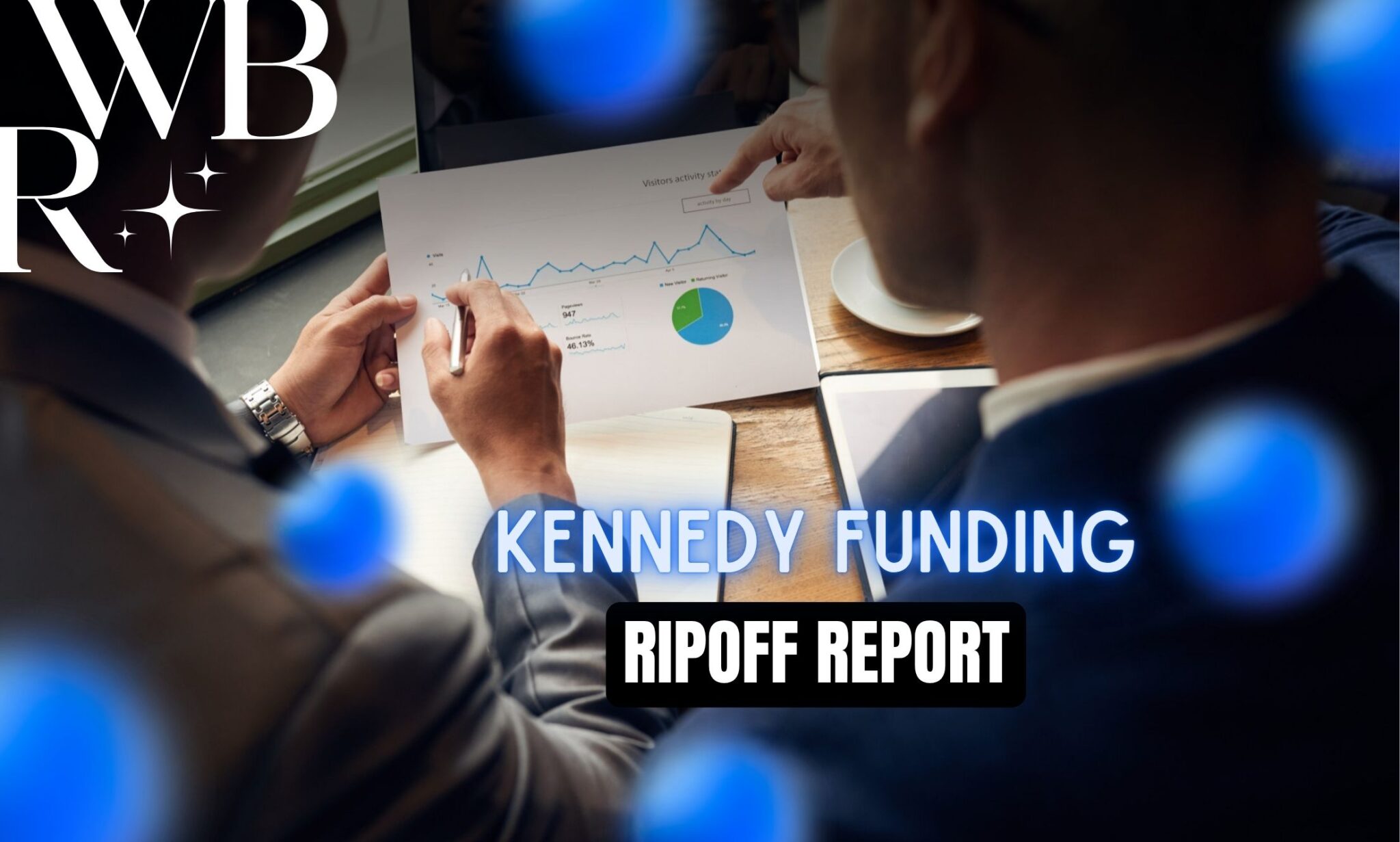Kennedy Funding Ripoff Report: A Look At The Controversy Surrounding The Private Lender
by Piyasa Mukhopadhyay Business Published on: 17 June 2025 Last Updated on: 01 July 2025

If you read business news regularly, you may have noticed Kennedy Funding. This private lending firm is recognized for financing complex real estate deals that banks frequently decline.
Kennedy Funding operates in a special area of finance that includes both opportunities for profit and potential risks.
Many people misunderstand this part of the financial world, and it often receives negative reviews online, especially on sites like Ripoff Report.
The reports criticizing Kennedy Funding Ripoff Report have sparked discussions among borrowers and industry watchers.
Many people, including myself, are asking questions about the company’s legitimacy and its practices as a private real estate lender.
Kennedy Funding offers short-term loans to investors. However, the company faces accusations of using unfair terms, including hidden fees and failing to keep its promises.
In this article, I will examine these claims, the company’s responses, and what borrowers should consider before getting involved.
What Is Kennedy Funding And What Is It About?

Kennedy Funding is a private lending company that primarily offers hard money loans to real estate investors.
Moreover, they help those who need quick financing for fix-and-flip projects or distressed properties.
The company serves borrowers who cannot get traditional bank loans by providing fast approvals and flexible terms.
However, numerous complaints have been made about Kennedy Funding on platforms such as:
- Ripoff Report
- Trustpilot
- The Better Business Bureau (BBB).
Unlike regular banks that focus on safe, long-term loans, Kennedy Funding operates in a high-risk area.
They lend money to developers, investors, or businesses that often struggle to find financing due to poor credit, legal issues, or unusual assets.
Their typical clients include:
– Real estate developers are waiting for zoning approvals.
– Investors refinancing distressed properties.
– Borrowers needing quick capital outside traditional credit sources.
This approach brings both praise for funding difficult deals and criticism from borrowers who may not understand the challenges of private financing.
What Is A Ripoff Report?

The term “Ripoff Report” refers to a popular website where people can post complaints about companies anonymously.
This site helps consumers but does not moderate or fact-check the claims made, which means false or outdated reports can remain online.
Many posts about Kennedy Funding appear under the “ripoff report” label. These often mention issues like:
- Denied funding after applying.
- Paying fees for checks on due diligence without receiving a loan.
- Claims of miscommunication or misrepresentation.
It’s important to remember that these reports, especially when unverified, may not tell the whole story. In private lending, borrowers often become frustrated. This often stems from:
- Misunderstandings
- Complicated legal situations
- Failure to meet lending criteria
What Are The Steps Involved In Private Lending?

When I went to discuss the Kennedy Funding Ripoff Report with a friend, he was pretty clueless about the whole thing. I asked him whether he was unaware of the news.
Instead, he told me that he is quite new to the business world and is still unfamiliar with most of the terms here, one of which is private lending.
I told him what I would tell you all now. If you don’t have a proper understanding of private lending and how it works, you won’t be able to understand anything about the Kennedy Funding Ripoff Report.
So, to start with the basics, here’s how private funding works:
1. The Initial Query
Suppose you are a borrower. You will approach Kennedy Funding with a deal, as it is a private lending firm.
Furthermore, you are ready to mortgage any sort of land or real estate, and you are in need of some fast funding. The company will analyze the value of these assets and your financial condition.
2. Letter Of Intent (LOI)
After the company has reviewed your assets, if they are still interested, they will issue a Letter of Intent (LOI).
Additionally, this letter includes all the necessary information regarding the private land, including interest rates, loan amount, and details of all collateral.
3. Due Diligence And Underwriting
The lender conducts thorough due diligence on the borrower, evaluating their creditworthiness, financial stability, and ability to repay the loan.
Furthermore, this may involve reviewing financial statements, credit reports, and other relevant documents.
Additionally, if the asset or borrower does not meet the required risk criteria during the underwriting process, the lender may choose to withdraw from the transaction.
This often leads to complaints because borrowers believe they were promised funding, even though it was conditional from the start.
4. Closing And Disbursement
Upon approval and agreement, the loan funds are disbursed to the borrower, and the lender begins servicing the loan.
This includes collecting payments and monitoring the borrower’s compliance with the loan terms and conditions.
What Is The Connection Between Private Lending And Ripoff Reports?
Borrowers who use private lenders often face urgent financial issues. If a loan doesn’t close, especially after paying fees, emotions can run high. Here’s why complaints arise:
- Some borrowers believe a Letter of Intent (LOI) is a guarantee, unaware that it is merely a preliminary step that requires final approval.
- Due diligence costs are essential, but borrowers often see them as wasted money if the loan isn’t delivered.
- Private lenders can make quick decisions, unlike banks, which often have slower processes and stricter rules. This speed can lead to mixed outcomes.
- Anonymity online can lead to exaggerated or biased stories that stick around for a long time.
In Kennedy Funding’s case, these dynamics have contributed to negative online portrayals, many of which lack legal backing or third-party verification.
Common Complaints In Kennedy Funding Ripoff Reports
Allegations against Kennedy Funding fall into several categories:
- Borrowers claim fees for appraisals, underwriting, and “administrative costs” inflate loan amounts beyond agreed terms.
- Multiple reports allege the company delays or denies disbursements after contracts are signed, leaving borrowers in financial limbo.
- Former clients describe harassing calls and threats of foreclosure over minor payment delays.
- Ads promising “guaranteed approvals” or “no credit checks” are said to lure borrowers into unfavorable agreements.
A 2023 Ripoff Report entry detailed a borrower’s $250,000 loan that accrued $50,000 in unexpected fees within months, leading to default threats.
What Are The Legal And Ethical Considerations?
As I have mentioned earlier, there were numerous negative reports. According to federal authorities, there is no evidence of regulatory violations or legal misconduct by Kennedy Funding.
The firm is licensed and follows private lending laws. It also shares its lending criteria publicly.
Furthermore, Kennedy Funding has funded deals in over 40 U.S. states and several foreign countries.
These deals include multimillion-dollar loans for development, land purchases, and hospitality projects, many of which are in areas that traditional banks consider too risky.
While the company receives criticism, it’s essential to understand the context: lending to distressed borrowers often presents challenges.
Furthermore, some deals may not close, and not every disappointed applicant is a victim of wrongdoing.
What Borrowers Should Know Before Using Private Lenders?
Of course, after getting to know about the Kennedy Funding Ripoff Report, you all might be having second thoughts regarding the whole concept of private lending.
Well, let me tell you, although every little venture with money involved is risky, there are certain things every borrower must know before going for private lending:
1. Thoroughly Read The LOI
As I have already mentioned the importance of this letter, I would like to reiterate: please read your Letter of Intent (LOI) thoroughly.
Make sure you understand the contingencies well. This might look like a loan commitment, but it sure isn’t one.
2. Expect Due Diligence
Due diligence is always practiced as a standard in private lending; therefore, make sure to take it seriously.
Furthermore, the cover includes third-party services such as appraisals and legal review. Mind you, these are nonrefundable.
3. Maintain Transparency About Finances
Always be responsible for your financial matters. You see, any sort of unclosed litigation can hamper your deals.
Furthermore, if any sort of liens or environmental concerns pop up, it may also harm your deal. As I always say, prevention is better than a cure.
4. Keep A Track Of The Lender As Well As Yourself
Search for verified client references, verify licensing, and consult with other borrowers when possible. But also recognize your role in meeting conditions.
5. Get Clarity About The Timeline
Know how long the loan will last, what default looks like, and what the refinance or repayment strategy is.
Kennedy Funding’s Public Position
Kennedy Funding aims to assist borrowers who are unable to obtain traditional loans. They promise to provide fair and clear access to funding. Here are their key points:
– They disclose all fees and terms in writing.
– Only qualified deals move forward.
– They conduct thorough checks because there are high risks involved.
Furthermore, they recognize that with substantial financial stakes and tight deadlines, mistakes can occur.
However, Kennedy Funding believes that most borrower complaints stem from misunderstandings, rather than wrongdoing.
The Response Of Kennedy Funding
Kennedy Funding rejects claims of wrongdoing and states that complaints come from borrowers misunderstanding their contract terms.
Moreover, the company cites its A+ BBB rating and decades of experience to demonstrate its legitimacy as a business. In a 2024 statement, a spokesperson said:
“We adhere to strict compliance standards. Borrowers receive full disclosures, and our terms are non-negotiable to mitigate risk.”
However, critics argue the BBB rating reflects resolved complaints rather than ethical practices.
The Broader Debate: Is Ripoff Report a Fair Tool?
Kennedy Funding appears on consumer complaint websites, leading to a bigger question: Are sites like Ripoff Report helpful or harmful?
These sites give consumers a platform to share their experiences and can reveal patterns of problems. However, they also have downsides:
They allow people to post complaints anonymously without requiring proof of identity.
Furthermore, once a complaint is posted, it cannot be removed, even if the issue is resolved or proven to be untrue.
Additionally, these complaints appear in search results and can harm reputations for an extended period.
They can be used in business disputes to gain a competitive advantage.
Moreover, for both borrowers and investors, relying only on these sites can give a distorted view.
A single complaint, even if strong emotions accompany it, rarely represents the full picture of a financial deal.
Kennedy Funding Ripoff Report: Who Are The Competitors Of This Firm?
| Overall Ranking | Details Of The Company | Brief Description | Total Fund | Name of Investors | Transaction Score |
| 1st | Investec 2010, London (United Kingdom), Acquired | Provider of global banking, investment, and wealth management services | – | Swedfund, Randvest Capital & 1 others | 75/100 |
| 2nd | Fidelity Investments 1946, Boston (United States), Public | Provider of financial advisory services | – | Wells Fargo, Oxeon Partners & 4 others | 75/100 |
| 3rd | Morgan Stanley 1935, New York City (United States), Public | Provider of wealth, financial management, and investment advisory services | – | Bain Capital Private Equity, IFC Asset Management Company | 71/100 |
| 4th | Guggenheim Partners 1999, New York City (United States), Acquired | Provider of asset management and investment advisory services | $21M | OnRamp Insurance Conference, Burch Creative Capital & 1 others | 70/100 |
| 5th | USAA 1922, San Antonio (United States), Acquired | Integrated financial service company | – | – | 69/100 |
| 6th | Principal 1879, Des Moines (United States), Public | Financial investment management and insurance company | – | Stone Point Capital | 69/100 |
| 7th | S&P Global 1917, New York City (United States), Public | Platform offering business intelligence solutions that combine data and actionable analytics for clients | – | Temasek, European Union | 69/100 |
| 8th | Northwestern Mutual 1857, Milwaukee (United States), Public | Provider of diversified asset management services | – | OnRamp Insurance Conference, Jindal Ventures | 69/100 |
| 9th | Bank of America 1904, Charlotte (United States), Public | Commercial bank and asset management firm | – | Berkshire Hathaway, PSP Investments & 4 others | 68/100 |
| 10th | John Hancock 1996, Boston (United States), Unfunded | Life insurance carrier | – | – | 68/100 |
| 11th | Kennedy Investment Group 2004, West Deptford (United States), Unfunded | Provider of financial planning and wealth management services |
When A Complaint Is Worth Investigating?
Borrowers should take complaints seriously, but also think critically about them. Look for red flags that need closer attention, such as repeated identical complaints over the years.
Other signs to investigate include documented legal actions or regulatory penalties and patterns of hidden fees or bait-and-switch tactics.
In the case of Kennedy Funding Ripoff Report, while there is some criticism, the company still completes large deals, has a public-facing team, and operates legally.
These factors suggest it is a legitimate business, though it may carry higher risks.
Kennedy Funding Ripoff Report: Judgment Beyond The Headlines
Kennedy Funding works in a high-stakes environment where deadlines are tight and emotions can run high.
This can lead some borrowers to express their complaints in public, especially when loans are not approved after they have invested time and money.
However, calling the company a “ripoff” without understanding how private lending works, what borrowers are responsible for, and the details of the deal is too simplistic.
Many complaints arise from the same factors that make private lending attractive: speed, flexibility, and selectivity.
For those considering borrowing, it’s essential to understand the process thoroughly, have a strong legal advisor, and maintain realistic expectations.
Private lending is not suitable for everyone, but for those who understand it, it can be a powerful financial tool.
Also read



































































































